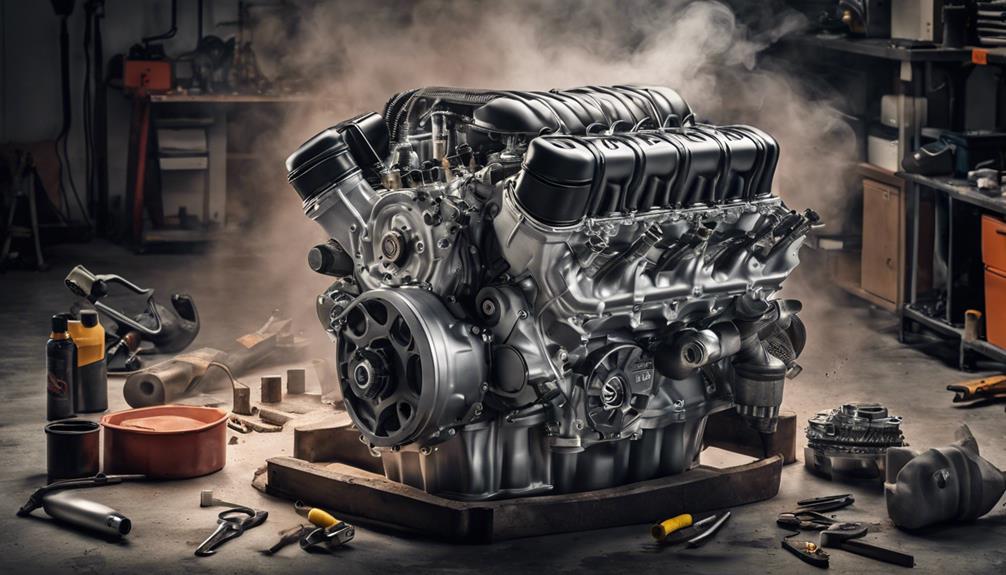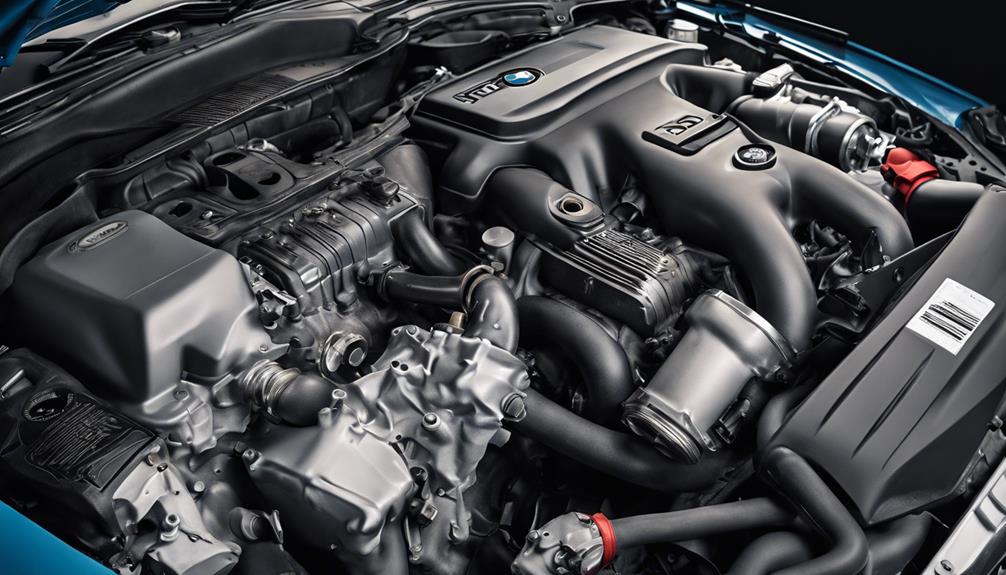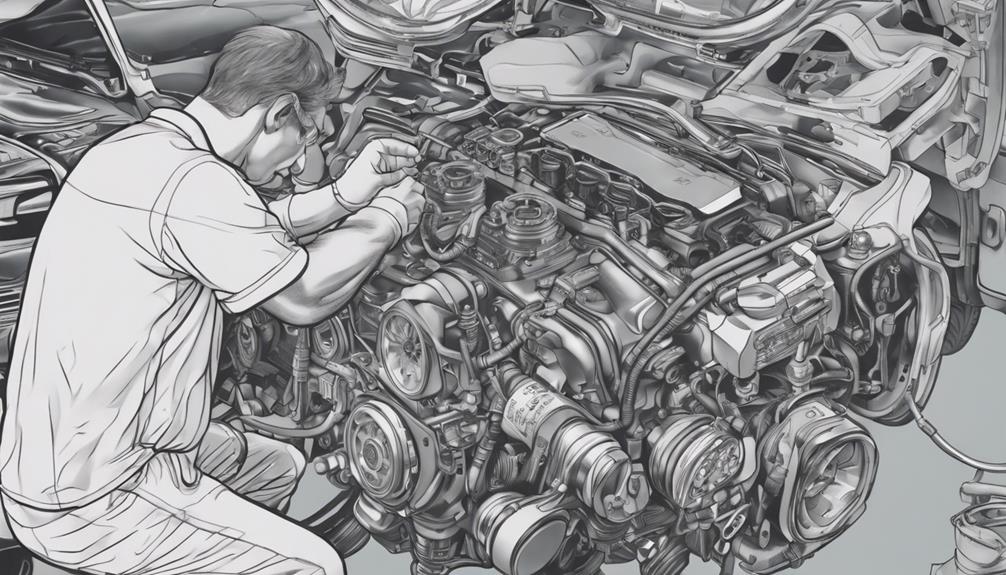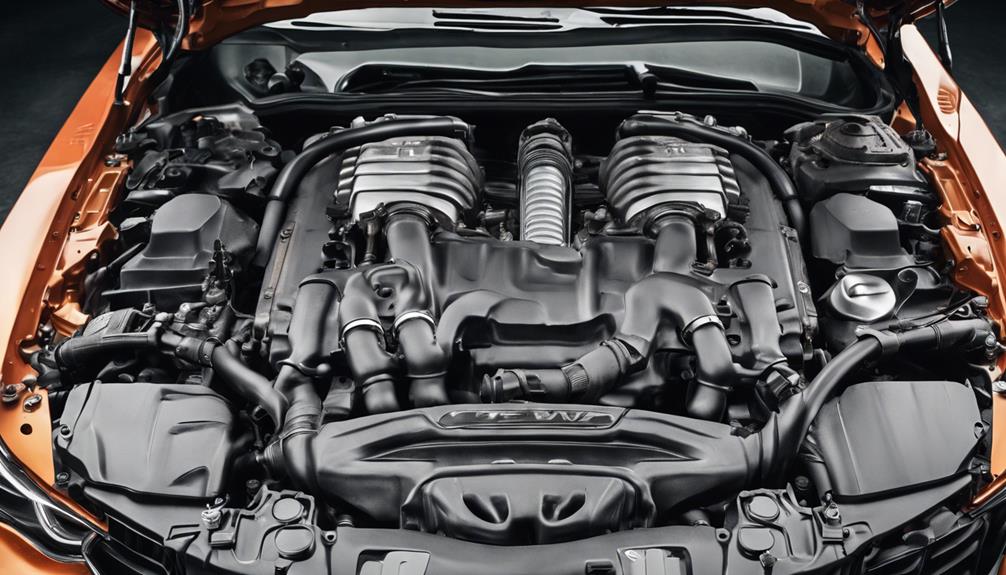Considering a BMW purchase? Well, while BMWs boast luxury and performance, they do come with a fair share of common issues that could spell trouble. From engine problems and oil leaks to cooling system failures and steering wheel vibrations, it's important to be aware of potential pitfalls for these elegant vehicles. Remember, being informed about these issues can help you make a well-rounded decision on your next car journey.
Key Takeaways
- BMWs can experience common issues like cooling system failures and oil leaks.
- Regular maintenance is crucial to prevent major problems in BMW vehicles.
- Timely detection and addressing of issues can prevent catastrophic engine failure.
- Older BMW models may be more susceptible to certain problems.
- Proactive attention to maintenance can help avoid costly repairs in BMWs.
Common BMW Engine Problems

When exploring the realm of BMW engineering, one can't overlook the importance of regular engine problems that often affect these high-performance vehicles. BMW engines are renowned for their power and precision, but they aren't immune to issues. Regular maintenance is vital to keeping your BMW engine running smoothly. Neglecting maintenance can lead to expensive repairs down the road.
One of the common BMW engine problems is related to the cooling system. Failures in this system can result in overheating, which is harmful to the engine's health. Another issue that BMW owners often face is fuel pump malfunctions. These can appear as poor acceleration and engine stuttering, impacting the overall performance of the vehicle. Additionally, timing chain failures aren't uncommon in BMW engines, potentially causing internal damage and loss of engine function.
To make sure your BMW engine stays in top condition, it's essential to stay on top of regular maintenance schedules and address any issues promptly. By taking care of your BMW engine, you can enjoy its exceptional performance for years to come.
Oil Leaks in BMWs
Oil leaks in BMWs present a common and potentially serious issue, often originating from valve cover gaskets and transmission areas. Detecting these leaks can be as simple as observing a tell-tale puddle of oil under the front of your car.
Additionally, leaky oil filter gaskets in BMWs can accelerate engine wear and tear if not addressed promptly. Ignoring these leaks might lead to catastrophic engine failure, underscoring the importance of timely maintenance.
It's worth noting that older BMW models are more susceptible to oil leaks than their newer counterparts, so staying vigilant is key. If you notice any signs of oil leakage, such as a burning smell or unusual engine noises, it's advisable to have your BMW inspected by a professional.
Cooling System Failures

Paying close attention to your BMW's cooling system is vital, as failures in this area can lead to engine overheating and costly repairs. Here are pivotal aspects to contemplate:
- Mileage Impact: Many BMW cooling systems fail between 80,000-120,000 miles, potentially causing overheating issues.
- Common Causes: Faulty water pumps or coolant leaks are frequent culprits behind BMW cooling system failures, emphasizing the need for proactive maintenance.
- Early Detection Importance: Detecting and addressing cooling system issues promptly can prevent expensive repairs and mitigate the risk of severe engine damage.
- Warning Signs: Keep an eye out for dashboard warning lights indicating cooling system problems, prompting timely action to avoid further complications.
Steering Wheel Vibrations
If you've ever felt your BMW's steering wheel vibrating, you're not alone. The causes of these vibrations can range from worn-out thrust arm bushings to misaligned wheels.
Adjustments to the steering wheel and addressing underlying issues like thrust arm bushing failure are important steps in resolving these unsettling vibrations.
Causes of Vibrations
Experiencing steering wheel vibrations in your BMW could signify underlying thrust arm bushing issues that demand immediate attention to maintain driving safety and prevent potential accidents. Here's a breakdown to help you understand the causes of these vibrations:
- Thrust Arm Bushing Problems: Commonly reported in BMW 3-series models, these issues often indicate potential thrust arm bushing failure around 75,000 miles.
- Signs of Failure: Look out for the steering wheel shaking, especially during braking, as it could be a sign of thrust arm bushing failures.
- Importance of Prompt Action: Addressing steering wheel vibrations promptly is essential to prevent further damage and guarantee driving safety.
- Preventive Measures: Regular maintenance and inspection of thrust arm bushings can help prevent steering wheel vibrations and associated safety risks in BMW vehicles.
Steering Wheel Adjustments
Wondering how to fine-tune your BMW's steering wheel to eliminate those pesky vibrations?
Steering wheel vibrations in BMWs are often attributed to thrust arm bushing issues, especially noticeable in models like the BMW 3-series. The shaking you feel, particularly during braking, isn't just an essential concern; it can also be a safety issue, potentially leading to accidents if left unaddressed.
Typically, thrust arm bushing failure tends to occur around the 75,000-mile mark in BMW vehicles. Taking care of these vibrations promptly is vital not only for a smoother driving experience but also to prevent more significant mechanical complications down the road.
Resolving Vibration Issues
When addressing steering wheel vibrations in your BMW, tackling thrust arm bushing issues promptly is pivotal to maintaining a smooth and safe driving experience. If you're experiencing a shaking steering wheel, it's essential to address this issue before it escalates. Here's a breakdown to guide you through resolving vibration problems:
- Identify the Symptoms: Watch out for abnormal shaking or vibrations in your steering wheel.
- Check the Thrust Arm Bushings: Focus on inspecting and potentially replacing these components.
- Address the Issue Early: Don't wait – resolve thrust arm bushing problems promptly.
- Ensure Safe Driving: By fixing these vibrations, you enhance both safety and driving comfort in your BMW.
Automatic Headlights Malfunctions
If your BMW's automatic headlights start acting out, you might notice them flickering at odd times, causing confusion on the road.
Understanding common headlight issues and learning to troubleshoot automatic headlights can save you from potential battery drainage problems.
Stay sharp – quick repairs for headlight malfunctions can prevent safety hazards and bigger electrical headaches down the road.
Common Headlight Issues
Experiencing automatic headlight malfunctions in your BMW can lead to various challenges, from battery drainage to confusion for other drivers on the road. Here are some key points to ponder regarding common headlight issues:
- Automatic headlights may stay on unnecessarily, draining the battery.
- Malfunctions in automatic headlights can lead to increased battery problems if not addressed promptly.
- Continuous use of malfunctioning automatic headlights can result in long-term battery drainage.
- The malfunction of automatic headlights in BMWs can cause confusion for other drivers on the road.
Ensuring your automatic headlights are functioning correctly is essential not only for your BMW's health but also for the safety and clarity it provides to fellow drivers on the road.
Troubleshooting Automatic Headlights
To troubleshoot automatic headlight malfunctions in your BMW effectively, start by checking the connections and wiring for any signs of damage or loose connections. Confirm the sensors are clean and unobstructed, as dirt or debris can interfere with their functionality.
Next, inspect the headlight control module for any visible damage or corrosion that may be causing the issue. If everything appears fine, consider resetting the automatic headlight system by disconnecting the battery for a few minutes.
Repairs for Headlight Malfunctions
When troubleshooting automatic headlight malfunctions in your BMW, prioritizing a thorough inspection of the connections, sensors, and control module is crucial for effective repairs. Here are some steps to guide you through resolving headlight malfunctions in your BMW:
- Check Connections: Examine all wiring connections to make sure they're secure and free of corrosion.
- Inspect Sensors: Verify the functionality of light sensors that activate the automatic headlights.
- Evaluate Control Module: Test the control module responsible for managing the automatic headlights.
- Verify Voltage: Confirm proper voltage levels reaching the headlights to guarantee peak performance.
AC Issues in BMWs
If your BMW's AC system is displaying weak airflow, strange odors, or inconsistent cooling, potential issues such as refrigerant leaks, faulty compressors, or electrical system failures may be at play. Addressing these AC issues promptly is essential to prevent further damage and guarantee your comfort while driving. Professional diagnosis and repair are recommended for complex AC problems in BMWs to maintain peak performance. Regular maintenance, including filter cleaning and refrigerant level checks, can help prevent major AC failures.
| Common Symptoms of AC Issues in BMWs |
|---|
| Weak Airflow |
| Strange Odors |
| Inconsistent Cooling |
| Refrigerant Leaks |
| Faulty Compressors |
Oil Filter Gasket Leaks
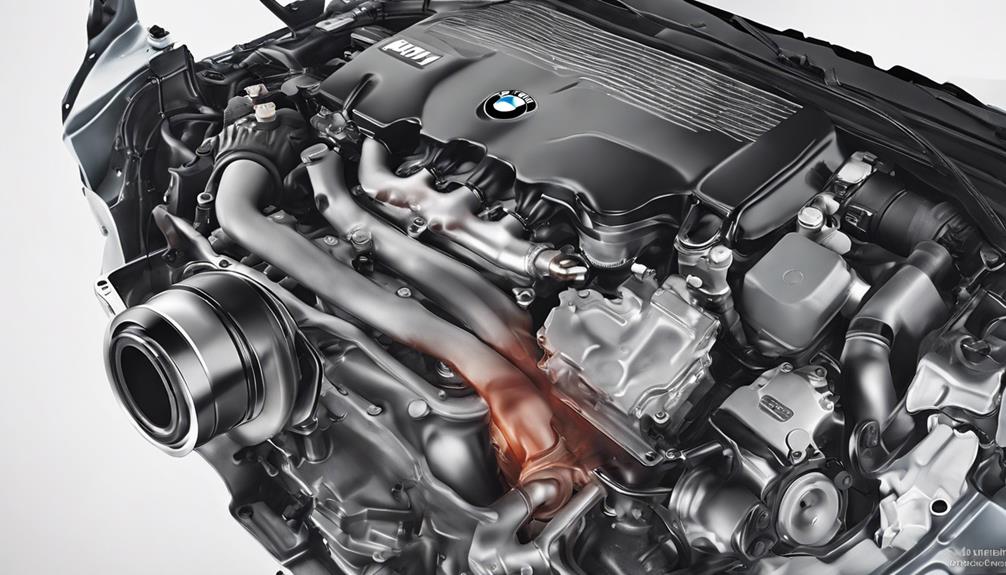
Dealing with oil filter gasket leaks in your BMW demands immediate attention to prevent detrimental engine damage and costly repairs down the road. Here's why addressing oil filter gasket leaks promptly is important:
- Increased Wear and Tear: Leaky oil filter gaskets can accelerate wear and tear on your BMW's engine, potentially leading to more significant issues over time.
- Preventing Catastrophic Engine Failure: Detecting and fixing these leaks early on can prevent catastrophic engine failure, saving you from a hefty repair bill.
- Costly Repairs: Delaying repairs for oil filter gasket leaks can result in expensive fixes amounting to several hundred dollars, making it essential to act swiftly.
- Importance of Regular Maintenance Checks: Oil filter gasket leaks are more common in older BMW models due to wear and tear. Regular maintenance checks play a crucial role in identifying and addressing these leaks promptly, ensuring optimal engine health.
Stay proactive with your BMW's maintenance to keep these pesky oil filter gasket leaks at bay and your engine running smoothly.
Coolant System Faults
Coolant system faults in BMW vehicles pose a significant risk to engine performance and longevity, demanding proactive attention to prevent potential breakdowns. Neglecting the health of your coolant system can lead to engine overheating, a vital issue resulting from faulty water pumps or coolant leaks. Regular servicing is essential to avoid costly repairs and potential engine damage, ensuring your BMW runs smoothly for years to come.
| BMW Coolant System Facts | |
|---|---|
| Critical for engine temperature regulation | Engine overheating risks |
| Many systems fail after 80,000-120,000 miles | Common issues: water pump failure, coolant leaks |
| Regular servicing prevents costly repairs | Potential engine damage without maintenance |
| Being stranded is a risk if the system fails | Proactive attention is key for longevity |
Fuel Pump Malfunction

Getting through the intricacies of BMW maintenance, fuel pump malfunctions stand out as a common challenge faced by owners, impacting performance and reliability. When your BMW's fuel pump starts acting up, it can lead to a frustrating driving experience. Here's what you need to know:
- Symptoms: Keep an eye out for signs like engine misfires, rough idling, and difficulty starting the vehicle. These issues can indicate an essential fuel pump.
- Impact on Performance: A malfunctioning fuel pump can result in poor acceleration, making your driving experience less smooth and responsive.
- Functionality: The fuel pump plays an important role in delivering fuel from the tank to the engine at the correct pressure, ensuring proper combustion and performance.
- Consequences of Ignoring: Ignoring fuel pump problems can escalate to engine overheating, reduced fuel efficiency, and even potential engine damage. Addressing these issues promptly is key to maintaining your BMW's performance and longevity.
Don't let a faulty fuel pump dampen your BMW driving experience; stay attentive to these signs for a smoother ride.
Timing Chain Failure
When encountering timing chain failure in BMW engines, careful attention and immediate action are essential to prevent catastrophic internal damage and maintain peak engine performance. Ignoring the warning signs of timing chain issues, such as engine rattling or the check engine light illuminating, can lead to expensive repairs and potential engine failure. Here is a breakdown of how timing chain problems can manifest:
| Symptom | Significance |
|---|---|
| Engine Rattling | Indicates possible timing chain wear or misalignment. |
| Rough Idling | Can be a result of timing chain tensioner failure. |
| Misfires | Due to timing chain skipping, affecting ignition timing. |
| Check Engine Light | Warns of potential timing chain or related engine issues. |
| Reduced Performance | Loss of power and efficiency due to timing chain issues. |
To safeguard your BMW from the perils of timing chain failure, prompt diagnosis and professional intervention are critical. Remember, addressing these issues swiftly can save you from significant headaches down the road.
Ignition Coil Problems
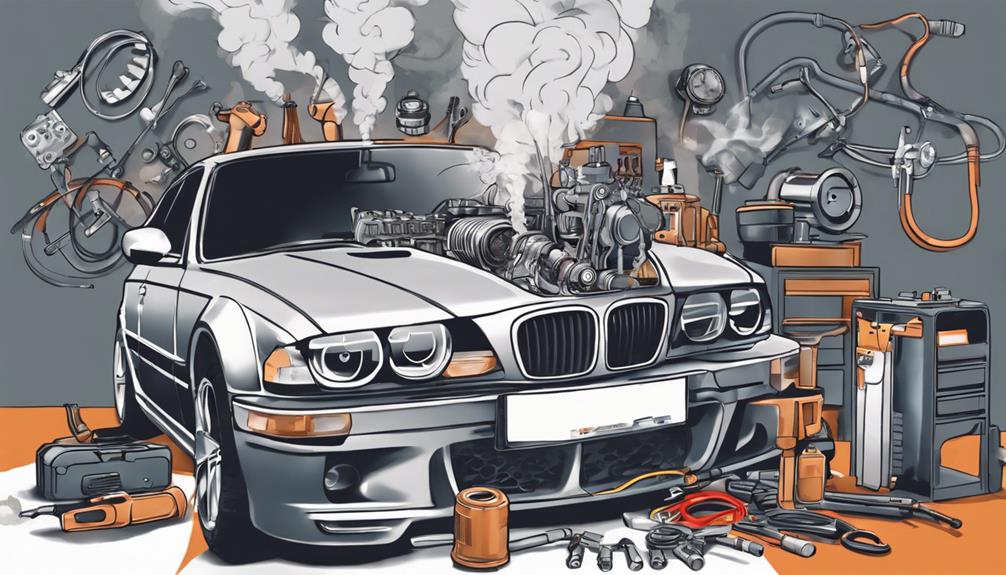
Ignition coil problems in BMWs can be a real headache, causing issues like sluggish acceleration and engine misfires. Addressing these symptoms promptly is important, as neglecting ignition coil issues can lead to more severe and costly engine complications.
Common Symptoms of Faulty Ignition Coils
Experiencing sluggish acceleration or noticeable power lag in your BMW could be indicative of underlying issues with the ignition coils. When it comes to recognizing problems with your BMW's ignition coils, here are common symptoms to watch out for:
- Sluggish Acceleration: If your BMW feels like it's struggling to pick up speed, it could be a sign of ignition coil trouble.
- Engine Misfires: Occasional jerking or shaking while driving may be due to misfires caused by faulty ignition coils.
- Power Lag: A delay in power delivery when you press the gas pedal can point towards issues with the ignition coils.
- Reduced Fuel Efficiency: Ignition coil problems can lead to poor fuel economy as the engine struggles to perform efficiently.
Repair Options for Ignition Coils
If your BMW is showing signs of ignition coil problems, exploring repair options promptly can help prevent further engine complications. Ignition coils are vital components in BMW engines, responsible for converting battery power into sparks for ignition. Ignoring ignition coil issues can lead to engine misfires, power loss, and potentially even damage to the cylinder head. To address these problems, seeking professional repair services is essential to maintain peak engine performance. Below is a table outlining some common repair options for ignition coil problems in BMW vehicles:
| Repair Option | Description |
|---|---|
| Coil Replacement | Installing new ignition coils to resolve malfunction. |
| Diagnostic Testing | Identifying faulty coils through diagnostic procedures. |
| Wiring Inspection | Checking wiring connections for any issues. |
| Regular Maintenance | Scheduled maintenance to prevent future coil problems. |
Spark Plug Issues
When it comes to BMWs, one essential aspect that demands attention is the potential spark plug issues that can impact performance and engine health. Here are some important points to keep in mind:
- Symptoms of Trouble: Spark plug issues in BMWs can lead to misfiring, rough idling, and reduced engine performance. If you notice difficulty starting the engine or poor fuel efficiency, it could be a sign of failing spark plugs.
- Consequences of Neglect: Ignoring spark plug problems can result in engine damage and costly repairs. Regular maintenance is key to preventing these issues and ensuring peak engine function.
- Maintenance Recommendations: It's generally advised to replace spark plugs every 30,000 to 50,000 miles to avoid potential problems down the road.
- Importance of Replacement: Proper maintenance of spark plugs is crucial for the overall health and performance of your BMW's engine. By staying proactive with spark plug replacements, you can help maintain your car's performance and longevity.
Frequently Asked Questions
Are BMWs Expensive to Maintain?
Maintaining a BMW can be pricey, costing around $1,000 to $1,500 annually. Special tools and diagnostic gear add to the expenses. Consider service plans for coverage. Regular upkeep is key to avoiding major repair bills.
Are BMW Actually Reliable?
Yes, BMWs are generally reliable. Routine maintenance is key to prevent common issues like AC problems or coolant leaks. Stay on top of care, and your BMW can provide a smooth ride.
What Are the Disadvantages of BMW Cars?
When pondering the drawbacks of BMW cars, issues such as oil leaks, cooling system failures, and faulty ignition coils come into play. Routine maintenance is essential to prevent serious consequences and guarantee smooth operation.
How Long Do BMWs Usually Last?
With proper maintenance and care, BMWs typically last around 200,000-250,000 miles. Oil changes every 5,000 miles can greatly extend their lifespan. Driving habits, road conditions, and upkeep history all influence how long your BMW will endure.
Conclusion
Overall, BMWs may be known for their luxury and performance, but they also come with their fair share of common problems.
From engine issues to cooling system failures, steering wheel vibrations to ignition coil problems, these luxury vehicles can sometimes be a headache for owners.
So, before you invest in a BMW, be prepared for potential repairs and maintenance to keep your ride running smoothly.






